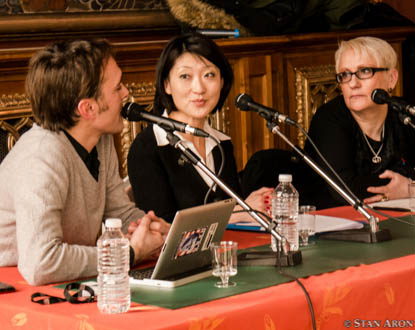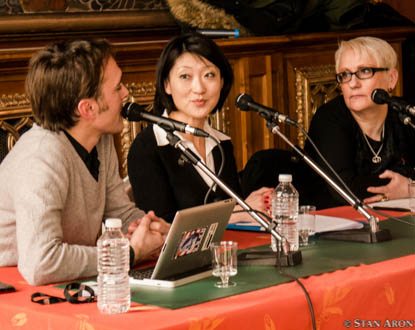During a conference organized on Thursday, February 14, by the magazine Marianne at the Mediterranean University Center, Fleur Pellerin and Mercedes Erra spoke about the regulation of digital communications.

Does the question make sense? According to the speakers, the “network of networks” is neither ethical nor immoral. However, the combination of relative anonymity, a virtual echo chamber, and difficult moderation of comments leads to unfortunate drifts: on one hand to invectives of “unprecedented violence,” and on the other hand to the erosion of privacy through the dissemination of anecdotes. Indeed, there are more paparazzi than ever. Consequently, blunders (like Rachida Dati’s slips) can now circle the globe in a matter of minutes.
“The Internet is not a lawless zone”
Mrs. Pellerin distinguishes between two visions of the Internet. The first is that of a separate world, with no connection to the physical world. The second is that of a space of freedom, where freedom of expression is unlimited. However, the first vision does not account for the very real effect of the internet on the physical world, and vice versa. The second vision, on the other hand, is potentially dangerous. “The Internet is not a lawless zone,” adds Mercedes Erra.
Both speakers agree that a regulation system must be found “to defend principles higher than freedom of expression.” The minister wants to apply local laws on the Internet, denouncing racist or discriminatory remarks made on the social network Twitter. However, she seems to neglect the disastrous effect this could have on the Internet globally. Certainly, French law is not excessively liberty-choking, but how can we ask American companies to enforce French local law on the web in our territory without other less democratic countries demanding the same? Let’s remember that without a free internet, without Twitter, the Arab Spring might not have happened. There are undeniably local laws that cannot be applied on the internet in the name of freedom of expression. Why would France have more legitimacy than others? Where is the line between acceptable local law and dictatorial, and who will draw this line?
“It’s not because there are non-democratic countries that France should give up applying its laws,” responds Mrs. Pellerin. According to her, one can both apply the French local law and fight for freedom of expression elsewhere in the world. If France had a closed Internet network, this might be possible. But one must not forget the international dimension of the Internet. The local does not exist on the web. Therefore, one must be aware of the global repercussions that local actions may have.



